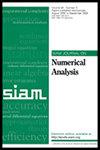Space-Time Finite Element Methods for Distributed Optimal Control of the Wave Equation
IF 2.8
2区 数学
Q1 MATHEMATICS, APPLIED
引用次数: 0
Abstract
SIAM Journal on Numerical Analysis, Volume 62, Issue 1, Page 452-475, February 2024.Abstract. We consider space-time tracking-type distributed optimal control problems for the wave equation in the space-time domain [math], where the control is assumed to be in the energy space [math], rather than in [math], which is more common. While the latter ensures a unique state in the Sobolev space [math], this does not define a solution isomorphism. Hence, we use an appropriate state space [math] such that the wave operator becomes an isomorphism from [math] onto [math]. Using space-time finite element spaces of piecewise linear continuous basis functions on completely unstructured but shape regular simplicial meshes, we derive a priori estimates for the error [math] between the computed space-time finite element solution [math] and the target function [math] with respect to the regularization parameter [math], and the space-time finite element mesh size [math], depending on the regularity of the desired state [math]. These estimates lead to the optimal choice [math] in order to define the regularization parameter [math] for a given space-time finite element mesh size [math] or to determine the required mesh size [math] when [math] is a given constant representing the costs of the control. The theoretical results will be supported by numerical examples with targets of different regularities, including discontinuous targets. Furthermore, an adaptive space-time finite element scheme is proposed and numerically analyzed.
用于波方程分布式优化控制的时空有限元方法
SIAM 数值分析期刊》第 62 卷第 1 期第 452-475 页,2024 年 2 月。 摘要。我们考虑时空域[math]中波方程的时空跟踪型分布式最优控制问题,其中假定控制在能量空间[math]中,而不是更常见的[math]中。虽然后者确保了 Sobolev 空间[math]中的唯一状态,但这并没有定义解的同构性。因此,我们使用适当的状态空间[math],这样波算子就成为从[math]到[math]的同构。通过在完全非结构化但形状规则的简网格上使用片断线性连续基函数的时空有限元空间,我们得出了计算出的时空有限元解[math]与目标函数[math]之间的误差[math]的先验估计值,该估计值与正则化参数[math]和时空有限元网格大小[math]有关,取决于所需的状态[math]的规则性。通过这些估计值,我们可以为给定的时空有限元网格尺寸[math]定义正则化参数[math],或在[math]为代表控制成本的给定常数时确定所需的网格尺寸[math],从而得出最佳选择[math]。理论结果将通过不同规则性目标(包括不连续目标)的数值示例来支持。此外,还提出了一种自适应时空有限元方案,并对其进行了数值分析。
本文章由计算机程序翻译,如有差异,请以英文原文为准。
求助全文
约1分钟内获得全文
求助全文
来源期刊
CiteScore
4.80
自引率
6.90%
发文量
110
审稿时长
4-8 weeks
期刊介绍:
SIAM Journal on Numerical Analysis (SINUM) contains research articles on the development and analysis of numerical methods. Topics include the rigorous study of convergence of algorithms, their accuracy, their stability, and their computational complexity. Also included are results in mathematical analysis that contribute to algorithm analysis, and computational results that demonstrate algorithm behavior and applicability.

 求助内容:
求助内容: 应助结果提醒方式:
应助结果提醒方式:


